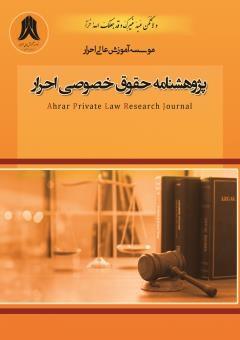شرط سود معین در قراردادهای مشارکت مدنی بانکی
محورهای موضوعی : حقوق مدنیسید صالح پیش بین 1 * , مهدی رضوانی راد 2
1 - کارشناسی ارشد حقوق خصوصی، گروه حقوق، دانشکده ادبیات و علوم انسانی، دانشگاه گیلان، رشت، ایران.
2 - کارشناسی ارشد حقوق خصوصی، گروه حقوق، دانشکده ادبیات و علوم انسانی، دانشگاه گیلان، رشت، ایران.
کلید واژه: مشارکت مدنی , نظام فقهی , سود معین , مشارکت ,
چکیده مقاله :
مشارکت مدنی، پُرکاربرد ترین قرارداد مشارکتی در نظام بانکی ایران است، شرط سود معین از جمله شروط ضمن این عقد است؛ که همواره محل چالش و تداخل مفاهیم با ربا را فراهم آورده است که برای یافتن پاسخی به آن پژوهش حاضر در چهار بخش مقدمه، کلیات، شرط سود و زیان، انتقادات و راهکار ها به جهت حل این موضوع به روش کتابخانه ای تنظیم میگردد؛ رویکرد فقها در این مورد به اجماع نرسیده و دچار اختلاف است ولی غالب فقها اعتقاد به صحت عقد و بطلان شرط دارند، با مطالعه و بررسی های صورت گرفته به نظر میرسد اینچنین شروطی ضمن قرارداد مشارکت مدنی بانکی نیازمند اصلاح و تنظیم مقررات به نحو جدی دارند؛ هر چند بتوان برای برخی از عقود مشارکتی و غیر مشارکتی دیگر آن را صحیح دانست.
Civil partnership is the most widely used form of partnership contract in Iran’s banking system. Among the terms embedded within this contract is the stipulation of a fixed profit, a provision that has consistently provoked debate due to its perceived conflict with the Islamic prohibition of usury (riba). This study seeks to address the issue through a structured, library-based approach, presented in four main sections: introduction, general principles, the condition of profit and loss, and critiques with proposed solutions. Islamic jurists have not reached a consensus on this matter; while most uphold the validity of the contract itself, they regard the fixed profit stipulation as invalid. Based on the findings, it appears that such provisions, when included in civil partnership contracts within the banking sector, necessitate substantial legal and regulatory reform. Nonetheless, similar conditions may be considered valid in certain other partnership and non-partnership contracts.
1. Ibn Idris, M, (1989), Al-Sara'ir al-Hawi for the Confusion of Fatawa, Volume 2, Islamic Publications affiliated with the Qom Seminary Teachers' Association [In Persian]
2. Emami, S H, (2023), Civil Law (Volume Two), Islamia Publications. [In Persian]
3. Hurr Ameli, M, (1979), Wasa’il al-Shi’ah, Volumes 2 and 15, Translated by (Muhammad Reza al-Husseini), Aal al-Bayt Institute. [In Persian]
4. Khavari, M R, (1992), Banking Law, Iranian Banking Institute (affiliated with the Central Bank of the Islamic Republic of Iran . [In Persian]
5. . Shahid Thani, Z, (2002), Masalak al-Afham, Volume 3, Al-Ma'arif al-Islamiyya Institute [In Persian]
6. Erfani, M,( 2009), Commercial Law: Commercial Companies, Volume 2, Jangal Publications [In Persian]
7. . Farzin Vash, A. (2004), Investigating Contracts in Islamic Banking, Monetary and Banking Research Institute [In Persian]
8. . Katouzian, N, (2023), Civil Law in the Current Legal System, Mizan Publications [In Persian]
9. . Katouzian, N (2019), General Rules of Contracts, Volume 1, Ganj Danesh Publications [In Persian]
10. . Kashani, M, (2023), Civil Law (Special Contracts), Mizan Publications [In Persian]
11. . Mohaqiq Hilli, A, (1979), Sharia al-Islam in matters of halal and haram, Volume 2, Ismaili Institute Publications [In Persian]
12. . Mohammadi Mani, A, (1998), Inference of Islamic Law Principles of Jurisprudence, Tehran University Press. [In Persian]
13. . Najafi, M,( 2017 ).Jawaher al-Kalaam, translated by Akbar Nayebzadeh, volumes 23 and 26, Khorsandi Publications [In Persian]
14. Asghari, M, (2003), A review of the goals of interest-free banking, Andisheh Hawza Magazine, pp. 59-76. [In Persian]
15. Pousti, Frank; Hassani, Zahra,( 2002), The Jurisprudential and Legal Nature of Usury, Specialized Journal of Jurisprudence and Fundamentals of Law, pp. 182-158. [In Persian]
16. Abdul Wasay Haghighi; Felix Po Merans, 2008,Islamic Banking from its Emergence to the Present, translated by (Mohammad Reza Shabanzad), Bank Eqtesad Magazine[In Persian]
17. Ghafouri Charkhabi, H, (2009), (Review of the verses on usury and its rulings), Scientific Quarterly Journal of Islamic Economic Studies, pp. 212-183[In Persian]

